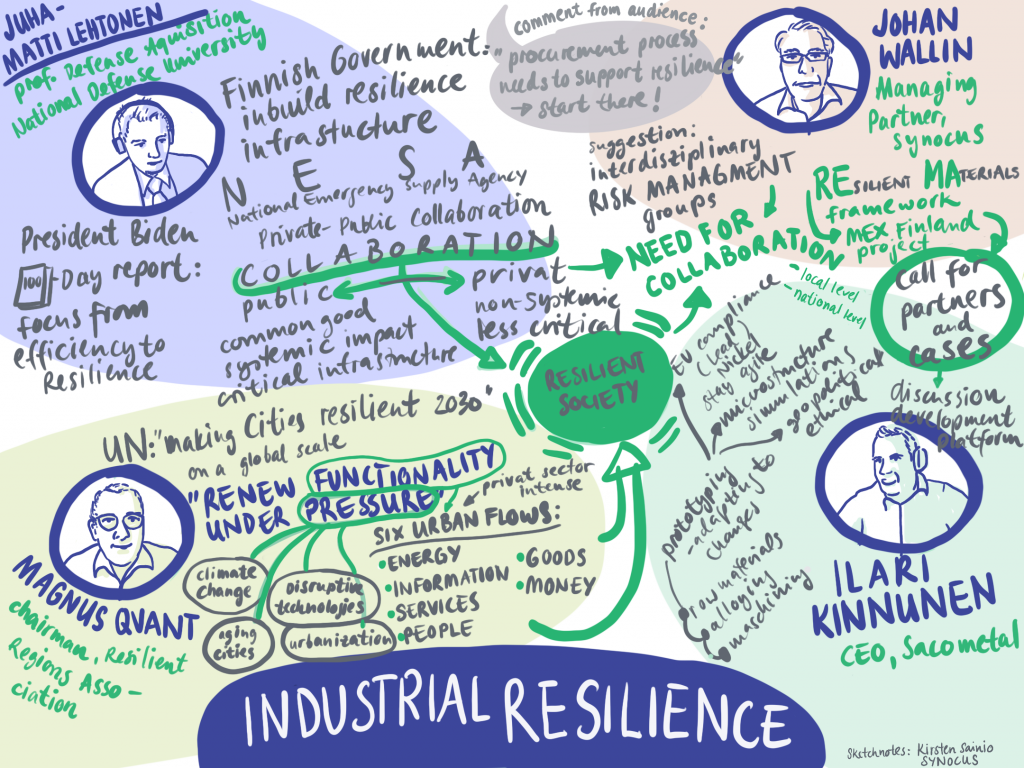26 April 2022
“Renewing functionality under pressure” – talking about resilience at MEX Finland’s second breakfast webinar
The second of MEX Finland’s breakfast webinars addressed the theme of industrial Resilience and brought together over 50 participants on April 21st, 2022. Our guest speakers Juha-Matti Lehtonen, Professor for Defense Acquisition at the National Defense University, and Magnus Qvant, Chairman of the Resilient Regions Association, were followed by MEX Finland member Ilari Kinnunen of Sacometal, a leading bronze expert in Finnish manufacturing. Moderated by Johan Wallin of Synocus, all three shared their view on resilience from their perspectives.
Juha-Matti Lehtonen, addressing the national perspective, described the work of NESA, the National Emergency Supply Agency (of Finland) that is responsible for the coordination of resilient critical infrastructure and stockpiling and the development of private-public collaboration. The roles of the private and the public sector are essential and influence resilience. The public sector typically holds roles of public good, like national security and securing critical infrastructures such as energy production and distribution or payment traffic. If compromised, they also bear a systemic risk with severe implications across many functions in society. The private roles are more non-systemic and are carried out in collaboration based on procurement processes. During the pandemic, the resiliency of Finland was tested, and while there are no official studies yet, the overall response was successful when compared to other worst-case scenarios.
The definition of resilience presented by Magnus Qvant is ‘renewal of functionality under pressure’, regardless of whether the pressure is long-term and chronic or sudden and shocking. In the context of cities, the challenges or pressures are those of climate change, aging infrastructure as well as an aging population, disruptive technologies, that have the power for systemic changes and rapid urbanization, accelerated through migration movements caused by war and climate change. Qvant described the functions of cities in six flows, that when impacted by sudden or long-term pressure need to be restored as soon as possible. These flows are Information, Goods, Services, People, Money, and Energy. Most of these flows run on the input of private-sector services but are often under the regulation of the public sector, stressing, as did Juha-Matti Lehtonen, the importance of collaboration between private and public actors. The strategic environment has changed, and resilient societies, based on a well-functioning, collaborative, agile system, are the first line of defense that armed forces rely on in a case of emergency. NATO is also aware of this, as signaled by its 2016 baseline requirements for civil preparedness.
Ilari Kinnunen guided our view then towards industrial resilience and in particular to the beginnings of MEX Finland’s new initiative “Resilient Materials”. Sacometal is a bronze foundry specialized in sourcing, alloying, and machining bronze, an important first step in any mechanical engineering operation. For companies like Sacometal, the challenges or pressures, as Qvant named them, are increasing EU restrictions on the use of lead, a key component in bronze alloys, and the geopolitical tensions and/or unethical mining processes in material supplying countries. The effort is to replace critical, in short- or long-term unobtainable materials like lead or nickel without compromising the alloy’s properties. Sacometal is developing simulations on a microstructural level of alloys to optimize application-based alloys as part of the ‘Resilient Materials‘ initiative. Achieving this there calls for closer collaboration with the foundry clients for a more application-based, customized alloy. The initiative is seeking partners who are interested in developing the capabilities needed to strategically navigate this fast-changing environment and build a resilient system for the industry in the future. For more Information on this, don’t hesitate to contact Ilari Kinnunen (ilari.kinnunen(at)sacometal.fi) or Niklas Koski (niklas.koski(at)synocus.com)
The view on resilience offered from different angles was diverse, beginning from national defense and preparation strategies, over regional and city resilience to overcoming material sourcing challenges in the manufacturing industries. The discussion also identified similarities like the importance of close and agile collaboration between public- and private-sector partners. From the challenges of procurement and acquisition procedures to continual clear information flows.
